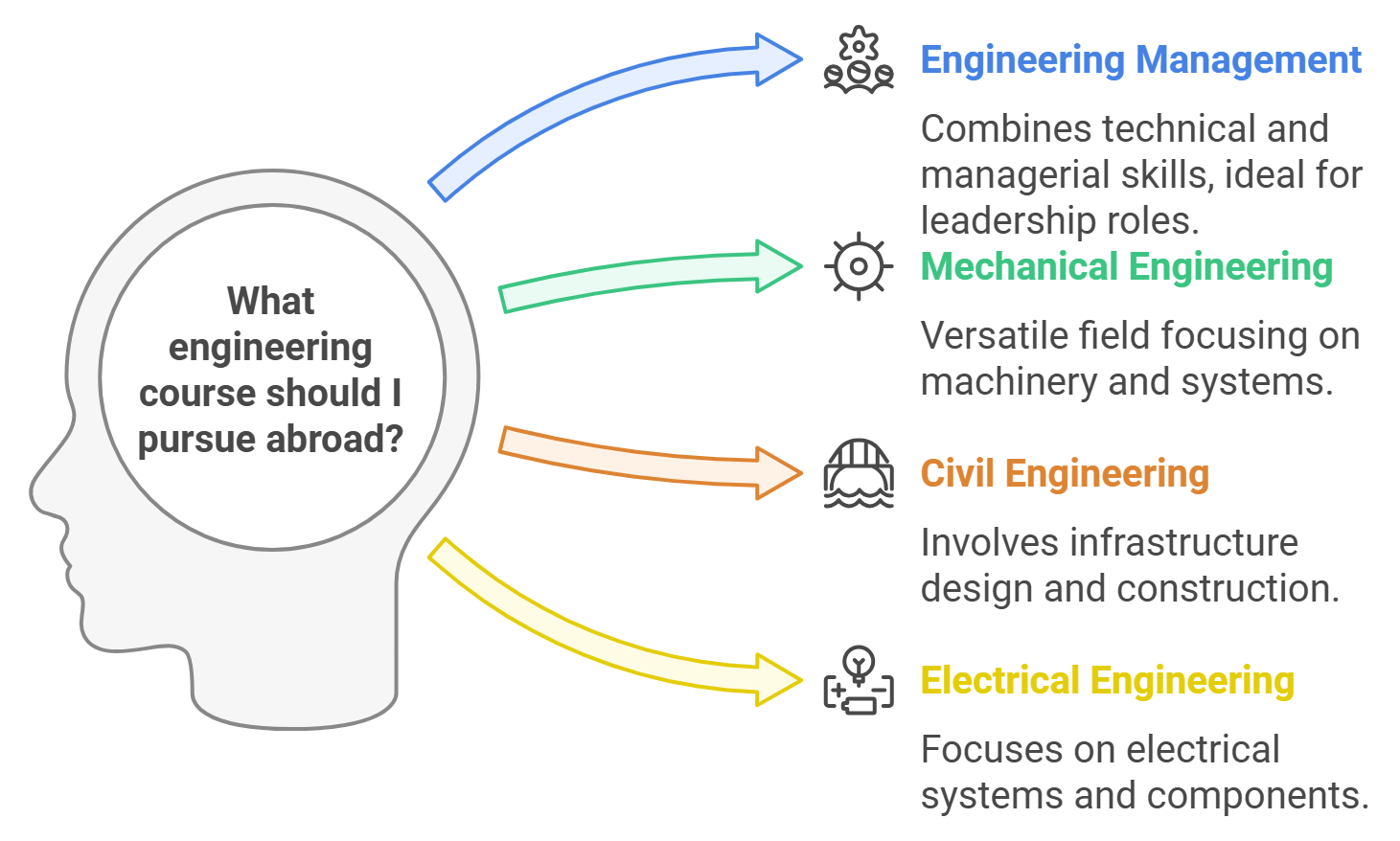.png?h=35&w=35&mode=stretch)
Yatin Kumar Study Abroad Content Specialist
Study Abroad Content Specialist
Engineering remains one of the most sought-after fields of study globally, particularly among Indian students. According to recent statistics, nearly 30% of Indian students pursuing higher education abroad opt for engineering courses. This trend is driven by the vast array of career opportunities, with engineering graduates seeing a 7% annual growth in global job demand. Whether driven by a passion for technology, innovation, or infrastructure, studying engineering abroad opens doors to world-class education and access to groundbreaking research. With over 80% of top engineering universities offering state-of-the-art facilities, students are positioned to gain cutting-edge knowledge and enhance their global career prospects.
|
Here are some reasons why Indian Students Prefer Engineering Abroad:
|

Also Read: Requirements to Study in USA for International Students
Top 10 Engineering Courses to Study Abroad
Listed are the top 10 Engineering Courses for International students to Study Abroad:
| Engineering Course | Key Focus | Potential Job Titles | Top Countries to Study |
|---|---|---|---|
| 1. Engineering Management | Combines technical expertise with management and leadership skills. | Utility Engineering Manager, Web Engineering Manager | USA, UK, Canada, Germany |
| 2. Mechanical Engineering | Design, develop, and test mechanical and thermal devices. | Automotive Engineer, Robotics Engineer, Machine Learning Engineer | USA, Germany, UK, Japan |
| 3. Civil Engineering | Focuses on infrastructure design, construction, and maintenance (bridges, roads, dams). | Construction Manager, Design Engineer, Geotechnical Engineer | USA, UK, Canada, Australia |
| 4. Electrical Engineering | Involves design and development of electrical systems and components. | Test Engineer, Design Engineer, Project Engineer | USA, Germany, Canada, Australia |
| 5. Automotive Engineering | Focuses on vehicle design, development, and performance. | Automobile Designer, Quality Engineer, Service Engineer | Germany, USA, UK, Japan |
| 6. Aeronautical Engineering | Involves the design, construction, and maintenance of aircraft and spacecraft. | Aerospace Engineer, Flight Test Engineer, Systems Engineer | USA, UK, Canada, Australia |
| 7. Computer Engineering | Combines computer science and electrical engineering to design software and hardware. | Software Developer, Hardware Engineer, System Architect | USA, Germany, Canada, Australia |
| 8. Cybersecurity | Focuses on protecting computer systems and networks from cyber threats. | Cybersecurity Analyst, Ethical Hacker, Systems Engineer | USA, UK, Canada, Australia |
| 9. Big Data Engineering | Deals with the management, analysis, and interpretation of large data sets. | Data Scientist, Machine Learning Engineer, Data Analyst | USA, UK, Canada, Germany |
| 10. Software Engineering | Focuses on the development and maintenance of software applications. | Software Engineer, Web Developer, Software Architect | USA, UK, Germany, Canada, Australia |
Engineering Courses in detail:
- Engineering Management
- Focus: Merges technical engineering skills with business and managerial capabilities. Prepares you for leadership roles.
- Why Choose: Ideal for those interested in both technology and management.
- Key Topics: Financial Management, Operations, Leadership, Organizational Behaviour.
- Career Options: Utility Engineering Manager, Web Engineering Manager
- Average Salary (USD): $80,000 - $120,000 (₹6,77,520 - ₹10,16,280)
- Top Universities: Stanford University, Massachusetts Institute of Technology (MIT), University of California, Berkeley.
- Mechanical Engineering
- Focus: Deals with the design and operation of machinery, equipment, and systems.
- Why Choose: One of the most versatile and evergreen engineering fields.
- Key Topics: Thermodynamics, Fluid Mechanics, Robotics.
- Career Options: Machine Learning Engineer, Automotive Engineer, Robotics Engineer.
- Average Salary (USD): $70,000 - $95,000 (₹5,92,830 - ₹8,03,550)
- Top Universities: University of Michigan, Georgia Tech, Technical University of Munich (TUM)
- Civil Engineering
- Focus: Construction, design, and maintenance of public infrastructure such as bridges, roads, and buildings.
- Why Choose: Offers high job stability and is critical to urban development.
- Key Topics: Structural Analysis, Hydrology, Geotechnical Engineering.
- Career Options: Construction Manager, Geotechnical Engineer, Environmental Engineer.
- Average Salary (USD): $60,000 - $85,000 (₹5,10,960 - ₹7,19,365)
- Top Universities: UC Berkeley, University of Cambridge, University of Oxford
- Electrical Engineering
- Focus: Development and testing of electrical systems, circuits, and power electronics.
- Why Choose: Essential in a wide range of industries, from power generation to telecommunications.
- Key Topics: Circuit Analysis, Power Systems, Network Analysis.
- Career Options: Project Engineer, Design Engineer, System Engineer.
- Average Salary (USD): $75,000 - $100,000 (₹6,77,520 - ₹8,46,960)
- Top Universities: ETH Zurich, Stanford University, University of California, Berkeley
- Automotive Engineering
- Focus: Designing and optimizing vehicles for performance and efficiency.
- Why Choose: A booming sector with innovation in electric vehicles and autonomous cars.
- Key Topics: Vehicle Dynamics, Fluid Mechanics, Applied Mechanics.
- Career Options: Automotive Designer, Quality Engineer, Service Engineer.
- Average Salary (USD): $65,000 - $90,000 (₹5,51,985 - ₹7,61,070)
- Top Universities: University of Michigan, University of Stuttgart, Politecnico di Torino
- Aeronautical Engineering
- Focus: Design, construction, and testing of aircraft and spacecraft.
- Why Choose: For those fascinated by aviation and space technology.
- Key Topics: Aerodynamics, Propulsion, Aircraft Design.
- Career Options: Aerospace Engineer, Flight Test Engineer, Systems Engineer.
- Average Salary (USD): $80,000 - $120,000 (₹6,77,520 - ₹10,16,280)
- Top Universities: Massachusetts Institute of Technology (MIT), Stanford University, University of Sydney
- Computer Engineering
- Focus: Combines hardware design and software development to create advanced computing systems.
- Why Choose: Excellent job prospects and opportunities in tech industries.
- Key Topics: Software Development, Network Security, Hardware Design.
- Career Options: Software Developer, Hardware Engineer, System Architect.
- Average Salary (USD): $85,000 - $115,000 (₹7,18,970 - ₹9,73,500)
- Top Universities: Stanford University, UC Berkeley, ETH Zurich
- Cybersecurity
- Focus: Protects data and networks from cyber threats and attacks.
- Why Choose: Rapid growth in demand for cybersecurity professionals.
- Key Topics: Network Security, Ethical Hacking, Cryptography.
- Career Options: Cybersecurity Analyst, Ethical Hacker, Systems Engineer.
- Average Salary (USD): $90,000 - $130,000 (₹7,61,070 - ₹11,00,850)
- Top Universities: Stanford University, University of Cambridge, University of California, Berkeley
- Big Data Engineering
- Focus: Involves the collection, analysis, and processing of large datasets for insights and decision-making.
- Why Choose: As data grows exponentially, the demand for Big Data experts continues to surge.
- Key Topics: Machine Learning, Data Visualization, Data Analytics.
- Career Options: Data Scientist, Machine Learning Engineer, Data Analyst.
- Average Salary (USD): $95,000 - $130,000 (₹8,04,390 - ₹11,00,850)
- Top Universities: MIT, Carnegie Mellon University, UC Berkeley
- Software Engineering
- Focus: Design, develop, and maintain software applications and systems.
- Why Choose: Highly in-demand skills across industries with excellent pay.
- Key Topics: Java Programming, Software Design, Computer Networks.
- Career Options: Software Engineer, Web Developer, Software Architect.
Top Engineering Universities in USA for Indian Students
| University | QS World Ranking (Engineering) | THE Ranking (Engineering) |
|---|---|---|
| Massachusetts Institute of Technology (MIT) | #1 | #3 |
| Stanford University | #2 | #2 |
| University of Oxford | #3 | #4 |
| University of Cambridge | #4 | #5 |
| University of California, Berkeley | #5 | #6 |
| ETH Zurich | #6 | #11 |
| Imperial College London | #7 | #10 |
| Harvard University | #8 | #1 |
| California Institute of Technology (Caltech) | #9 | #7 |
| EPFL (Swiss Federal Institute of Technology) | #10 | #20 |
Choosing the right engineering course is crucial for an exciting and prosperous career. The fields mentioned above are highly sought after due to their strong job prospects, global demand, and the evolving nature of technology. Studying at top universities abroad provides a chance to work with the best minds, access cutting-edge facilities, and build a global network. So, if you're looking to excel in the world of engineering, pursuing a course abroad could be the ultimate choice for your future.
Whether you're inclined toward mechanical and civil engineering, or interested in emerging fields like cybersecurity and big data, there's a vast range of options available to suit your interests and career goals. Start preparing now to take your engineering education to new heights!
FAQs
Ques. How can I choose the best engineering course for myself?
Ans: Choosing the right engineering course depends on your interests, skills, and long-term career goals. For instance:
- If you're passionate about technology and coding, Computer Engineering or Software Engineering may be ideal.
- If you’re drawn to solving real-world problems, Civil Engineering or Mechanical Engineering might be more suited to you.
- For those interested in leadership roles, Engineering Management can offer a balance between technical expertise and business acumen.
Start by researching the subjects covered in each course, the industries they serve, and the job roles you aspire to pursue. It's also helpful to talk to professionals in the field or alumni from universities you're considering. You can also take career counseling sessions for more clarity.
Ques. How can I finance my engineering studies abroad as an Indian student?
Ans. Financing education abroad can be daunting, but there are several options available:
- Scholarships: Many universities offer merit-based scholarships for international students. Countries like the USA, Canada, and the UK offer scholarships such as the Fulbright Scholarship (USA) or the Chevening Scholarship (UK). Check each university's financial aid page.
- Education Loans: You can apply for education loans from Indian banks like SBI, HDFC, or Axis Bank, which offer loans for studies abroad with flexible repayment options.
- Part-time Jobs: Most countries allow students to work part-time during their studies (up to 20 hours a week). This can help cover living expenses and give you practical exposure.
- Crowdfunding & Family Support: Some students also look into crowdfunding or financial support from family and friends.
Make sure you plan your finances well in advance to avoid any last-minute financial stress.
Ques. Are there job opportunities in India after completing engineering abroad?
Ans: Yes, many Indian students who graduate from top international universities in engineering return to India and find excellent job opportunities. Top Indian companies like Tata Consultancy Services (TCS), Infosys, and Wipro actively recruit graduates from universities abroad, especially from top-tier institutions in the USA, UK, and Europe. Moreover, there’s a growing demand for specialists in AI, Big Data, Cybersecurity, and Robotics in India, so students with expertise in emerging fields are highly sought after. The key is to leverage the global exposure and connections you’ve gained while studying abroad to tap into both Indian and international job markets.
Ques. What are the visa requirements for Indian students studying engineering abroad?
Ans. Visa requirements vary depending on the country you plan to study in. Here’s a brief overview:
- USA: You'll typically need an F-1 Visa. Once admitted to a university, you can apply for this visa, which allows you to stay in the US for the duration of your course and work part-time.
- Canada: The Study Permit is required for Indian students. It is relatively straightforward if you have a confirmed admission from a recognized university.
- UK: You'll need a Tier 4 (General) Student Visa. The UK also allows Indian students to stay for 2 years after graduation (under the Graduate Visa) to find work.
- Australia: The Student Visa (subclass 500) allows you to work up to 40 hours per fortnight during studies.
Always ensure you check the specific visa requirements and processing times for the country you're applying to and start the process early.
Ques. How do I adapt to a new cultural environment while studying abroad?
Ans. Moving to a new country can be overwhelming, but most universities offer resources to help international students adapt:
- International Student Support: Many universities have dedicated offices for international students that help with settling in, providing cultural exchange programs, and offering advice.
- Student Groups & Clubs: Joining student organizations related to your interests can help you meet new people and build a support network.
- Cultural Events & Festivals: Participate in local cultural events or international student gatherings. It helps you connect with local traditions while sharing your own culture.
- Stay Connected: Stay in touch with family and friends to ease the homesickness and get support when needed.
Being open to new experiences and stepping out of your comfort zone will make your transition smoother and more rewarding.
Ques. How can I improve my chances of getting into top engineering universities abroad?
Ans. Getting into a top engineering university requires careful preparation:
- Strong Academic Record: A good score in Class 12 (Physics, Chemistry, and Math) and competitive scores in exams like GRE (for the US), TOEFL/IELTS (for English proficiency), and possibly SAT/ACT are essential.
- Extracurricular Activities: Universities like to see a well-rounded profile, so participate in relevant extracurriculars like internships, research projects, and leadership roles in clubs.
- Statement of Purpose (SOP): Your SOP should reflect your passion for engineering, explain why you chose that particular field, and why the university you're applying to is the right fit for you.
- Letters of Recommendation (LOR): Strong LORs from teachers or mentors can make a big difference. Ensure they speak to your abilities in both academics and extracurricular activities.
Plan your applications well in advance and tailor each one to reflect your unique strengths and goals.









Comments